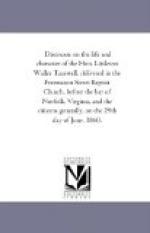In the spring of 1796, when he had attained his one-and-twentieth year, he was returned to the House of Delegates from the county of James City, and continued a member of the body until the close of the century. In that interval were discussed in the Assembly the leading measures of the administrations of Washington and the elder Adams; and a better school for a young politician cannot well be imagined. Of this period, the most interesting sessions were those of 1798-99, and of 1799-1800. During the first of these sessions, the famous resolutions of John Taylor of Caroline, which, it afterwards transpired, were drafted by Mr. Madison, were discussed with an ability which was honorable to both the great parties of the day, and which, at this distance of time, is proudly remembered; and in the last-named session was adopted that still more celebrated paper, from the pen of Madison, now known and honored as the Virginia Report. To both of these important papers Tazewell gave a cordial assent. It was during these two sessions he met with several of his college mates, as well as with some older statesmen whom he had not before seen in a public body. Among those who adhered to his side of the question were James Barbour, of Orange, the late Judge Daniel, of the General Court, one of the keenest minds of his time, the late Judge Cabell, president of the Court of Appeals, Wilson Cary Nicholas, afterwards Senator and Governor, Judge Archibald Stuart, Chancellor Creed Taylor, Governor Giles, Thomas Newton, Governor Pleasants, Samuel Tyler, French Strother, and Mr. Madison; and among those of the opposite side, were George Keith Taylor, his eloquent namesake from Norfolk, Robert Barraud Taylor, the late venerable John Eyre, Thomas M. Bayly, John Wise, James Breckenridge, Archibald Magill, and Henry Lee, of the Legion.
A painful domestic incident happened at this time, which had a material influence upon the future plans of Mr. Tazewell. Having lost his mother in his third year, he may be said hardly to have known a mother’s love; and he had fixed his affections on his elegant and accomplished father, who was his senior by only one and twenty years, who was in the vigor of manhood, and before whom a long and splendid career seemed to be in reserve. But this pleasing hope was destined to perish. Judge Tazewell, on his journey to Philadelphia, where Congress then held its sittings, had taken a severe cold, but was able to reach the city, and on the 21st day of January, 1799, took his




